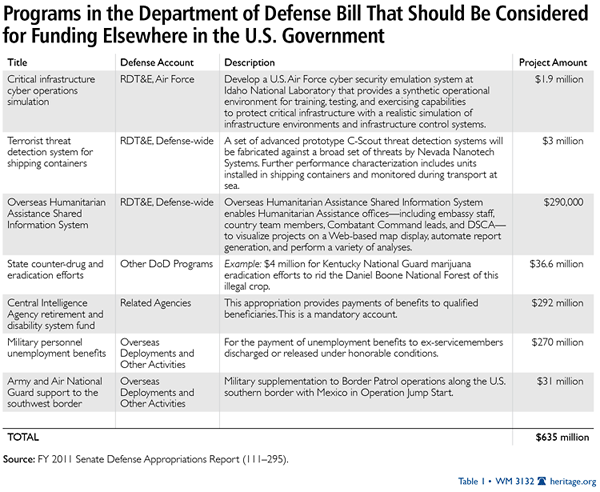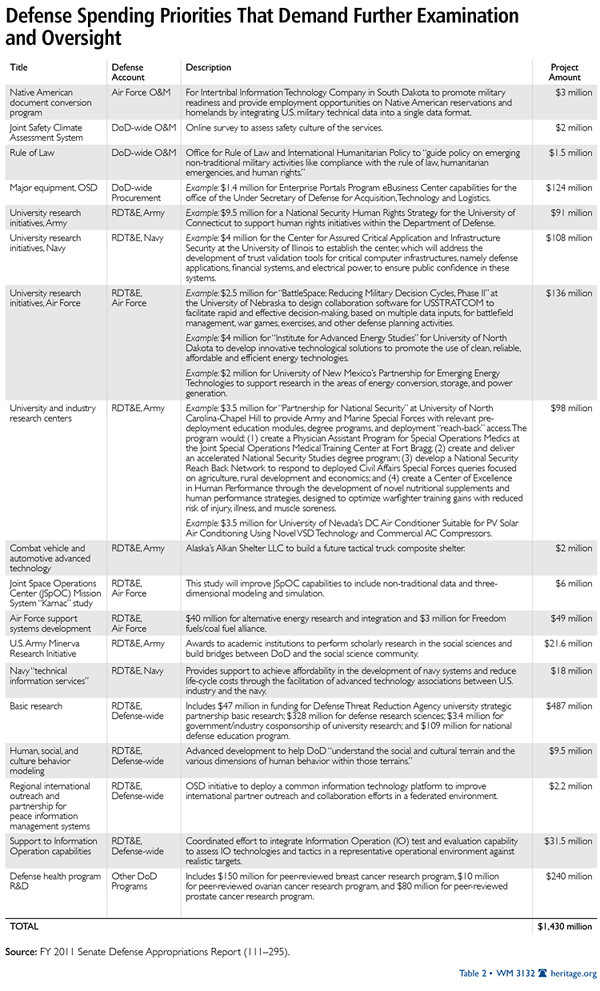In anticipation of Congress receiving the President’s defense budget request for fiscal year (FY) 2012 on February 14, Members would be wise to carefully review the House and Senate versions of the pending FY 2011 defense appropriations bills. This would help Congress gain valuable insight into what defense funding may be supported by another federal agency and what defense projects may not warrant funding in a military bill or any federal agency at all. Congress must reduce overall federal spending, and part of its due diligence will demand that it examine each defense program to ensure that it directly supports the overall mission of the Department of Defense (DoD) in support of the President’s National Security Strategy.
Tackling Waste, Fraud, and Abuse
Eliminating waste, fraud, and abuse is a fundamental obligation of government. Taxpayers deserve prudent spending and critical oversight. Washington should spend only what is necessary to provide for the common defense—no more, no less. The government has many tools to root out bad practices in government. However, initiatives to target waste—while they have historically improved defense management and achieved savings—have often not substantially reduced defense costs.
One oversight tool is the Federal Acquisition Regulation, an initiative by President Ronald Reagan to make government contracting policies uniform. It involves virtually every acquisition by federal agencies and governs each step of the process. All government departments must abide by dozens of standard terms and conditions dictated by the regulation—many of them non-negotiable. Mandatory federal conditions also include imposing standards of ethical conduct on contractors.
The DoD retains the authority to audit contractors’ costs incurred, profits, progress, and performance during the agreement period and up to three years after that period. The government can also take contractors to task through the contracting agency’s inspector general, the Special Inspector General for Iraq Reconstruction, the Army Audit Agency, the Defense Contract Audit Agency, or the Government Accountability Office.
Additionally, Congress and DoD have at their disposal a range of investigative tools. Virtually all federal agencies have internal law enforcement components, and the military services have criminal investigation divisions. The Department of Justice can also support efforts to uncover criminal activity on the part of contractors and government employees. Contractors that fail to abide by ethical standards or contract requirements can face civil litigation or criminal prosecution, as can civilian employees of the U.S. government. Military personnel are subject to the Uniform Code of Military Justice and, in some cases, can be tried in civilian courts.
Projects in the Defense Bill That Should Be Examined for Funding Elsewhere or Eliminated Altogether
Using the latest defense spending bills as an illustrative example, Members should look for projects in the defense budget that—while they may be wholly legitimate—should be considered for funding in another spending bill under a more appropriate federal agency. Examples are abundant.
One is a project for the air force to develop a cyber system that provides capabilities to protect critical infrastructure. This is surely an important task of government but possibly one better suited for the Department of Homeland Security (DHS), which, along with the private sector, is in charge of protecting the nation’s critical infrastructure. Another example is a program to develop advanced prototype threat detection systems for eventual installation inside shipping containers to monitor them during transport at sea. Again, this may or may not be a worthy project. Yet either way, it is more appropriate for Congress to fund this under a DHS spending bill, since DHS is charged with defeating threats to maritime cargo.
Other examples include funding for various state national guard units to eradicate marijuana from national forests or critical unemployment benefits for former servicemembers that should have likely been funded with all other government unemployment benefits.
Defense Programs That Warrant Further Scrutiny
As part of its constitutional mandate, Congress wields the “power of the purse” over the annual budget requests made by the President. The section of the U.S. Constitution commonly referred to as the Appropriations Clause stipulates that “No Money shall be drawn from the Treasury, but in Consequence of Appropriations made by Law; and a regular Statement and Account of the Receipts and Expenditures of all public Money shall be published from time to time.”
This clause provides Congress “with a mechanism to control or to limit spending by the federal government. The Framers chose the particular language of limitation, not authorization, for the first part of the clause and placed it in Section 9 of Article I, along with other restrictions on governmental actions to limit, most notably, executive action.”[1] The Constitution also gives Congress the power to provide for the common defense of the United States, to raise and support armies, and to make rules for the government and regulation of the land and naval forces.
As Justice Joseph Story wrote:
Congress may appropriate money … in aid of canals, roads, and other institutions of a similar nature, existing under state authority. The only limitations upon the power are those prescribed by the terms of the Constitution, that the objects shall be for the common defense, or the general welfare of the union. The true test is whether it be of a local character, and local use; or, whether it be of general benefit to the states. If it be purely local, Congress cannot constitutionally appropriate for the object. But, if the benefit be general, it matters not, whether in point of locality it be in one state, or several; whether it be of large, or small extent. Its nature and character determine the right, and Congress may appropriate money in aid of it; for it is then in a just sense for the general welfare.[2]
There is no question that the “nature and character” of spending to “provide for the common defense” is always of benefit to the nation as a whole, so it is always constitutional and appropriate for DoD. All other spending within the defense bill should be scrutinized by Congress to determine whether it should be moved to another agency or removed as wasteful spending.
This final say in how taxpayer funds are spent is crucial for more effective government. Congress does not just take the executive branch at its word. Members can and should regularly question the spending priorities and analysis behind those decisions when the annual defense budget request is made. Too often, the statement that “the Pentagon doesn’t want it” becomes a blank check for the executive branch when Congress has proven time and again that its Members have an important voice in setting the spending priorities of government.
History highlights plenty of examples where Congress has authorized policy or funding initiatives that DoD has strongly opposed, and in retrospect, Congress was right. Former Senator Sam Nunn (D–GA), for example, wanted the Air Force to buy more F-117s when the service wanted to stop purchases. Later it turned out that the F-117 was critical to establishing air dominance over Iraq in Operation Desert Storm. Another example is Congress continuing the Marine Corps’s V-22 program and prohibiting the retirement of U-2s and B-52s, which have proven their relevance in current operations Iraq and Afghanistan.
Nevertheless, there are examples of potentially wayward spending priorities within the defense bill that demand additional attention as defense budgets shrink. For example, Congress should carefully examine a series of social science grants known as the Minerva Research Initiative, which is presumably helping produce helpful research. The Pentagon estimates the total amount of the awards to amount to as much $50 million over five years.
These grants need to be cross-examined with the plethora of other funding by the DoD on research initiatives at universities in the United States. The army requested $91 million on its University Research Initiatives in FY 2011; the navy $109 million; and the air force $136 million. Additionally, the DoD requested $98 million for University and Industry Research Centers in the 2011 budget.
Due Diligence with Defense
Congress should examine federal spending on its merits and decide whether it is both constitutional and necessary. Members should also be aggressive in their efforts to eliminate waste in all federal agencies including DoD.
As part of an effort to reexamine defense spending priorities, Congress should carefully review last year’s defense spending bills to identify areas worthy of further scrutiny. This would ensure that taxpayer dollars are being spent wisely and that necessary funds are dedicated to the appropriate federal agency while unnecessary projects are cut from the overall federal budget to reduce spending.
Conducting due diligence in the defense budget is a critical step toward helping the military reach its goals of reprioritizing funds to bolster modernization plans after a decade of war and wear and tear on equipment.
Mackenzie Eaglen is Research Fellow for National Security in the Douglas and Sarah Allison Center for Foreign Policy Studies, a division of the Kathryn and Shelby Cullom Davis Institute for International Studies, at The Heritage Foundation.





